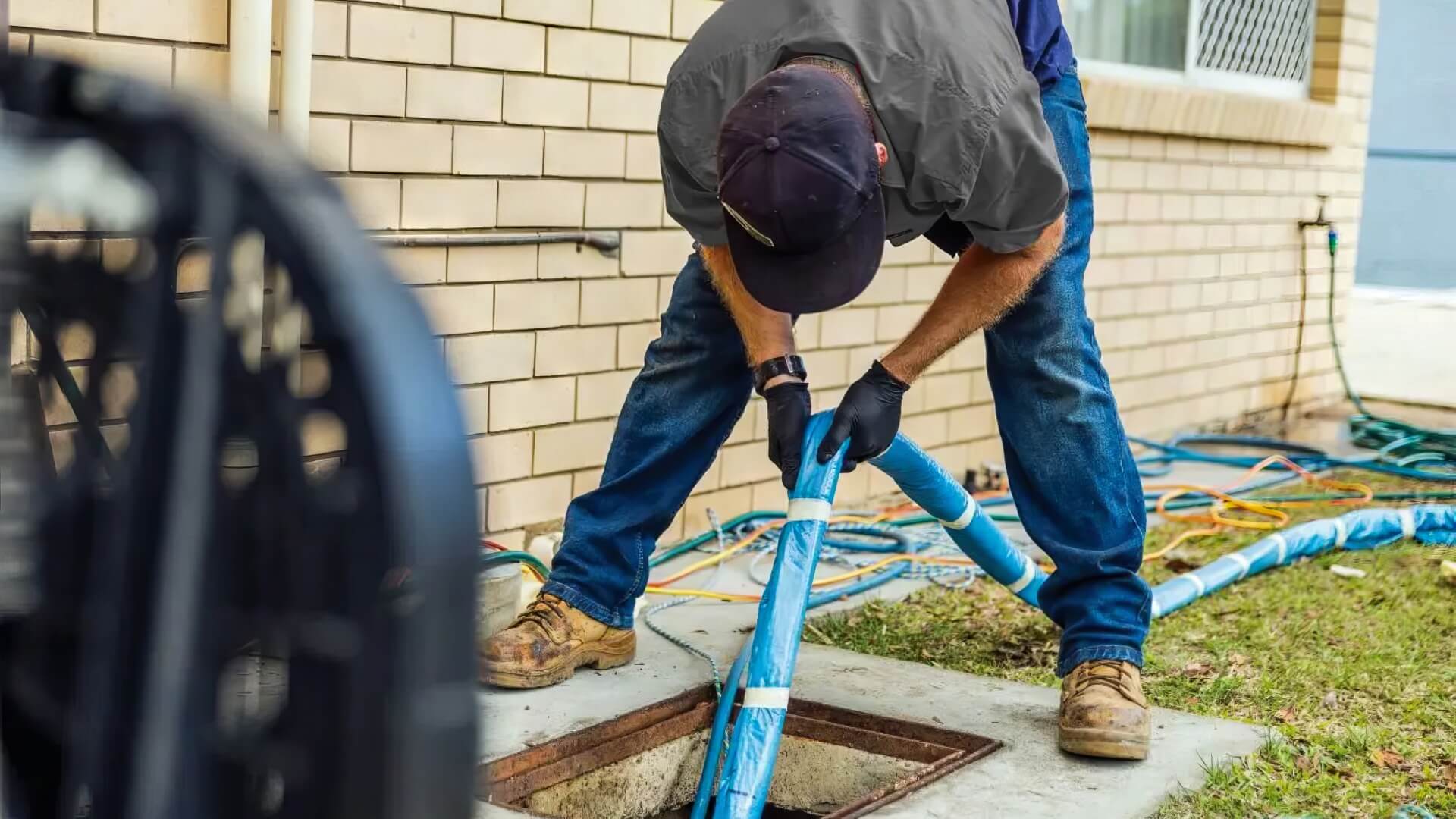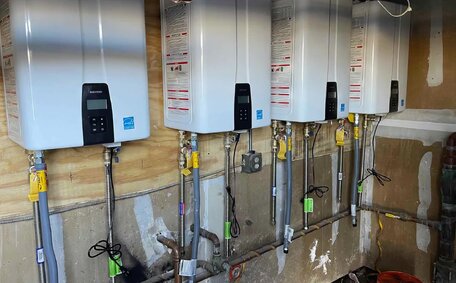Understanding Gas Appliance Safety
Gas heating appliances offer efficient solutions, empowering you to effectively heat homes and commercial kitchens across Australia. However, we must use them responsibly by following safety guidelines and getting regular service checks. Defective appliances and gas leaks can result in hazardous combustion products such as fire, explosion, and carbon monoxide poisoning.
Both flued and unflued gas appliances sold in Australia must comply with standards set by the Australian Gas Association and Gas Technical Regulators Committee.
These cover design, construction, performance, safety and environmental impact. New open flued gas heaters, stoves and other appliances should come with a certificate of compliance from the manufacturer. These cover design, construction, performance, safety and environmental impact.
As a home or business owner, ensure to check your gas heater and other appliances for any potential issues, including gas leaks, by having them installed and serviced by licensed gas fitter professionals. The technician will check gas connections thoroughly for leaks, ensure your local gas meter is functioning correctly, and guarantee vents and exhaust fans can become blocked, test safety valves and controls, and assess performance.
Do suspected gas leak checks by scheduling annual safety inspections even if they seem to be working fine. This proactively addresses concerns by allowing you to contact your gas technician before they escalate to dangers and helps maximise efficiency.
We also recommend installing carbon monoxide CO alarms as an extra safeguard. And educate everyone in your home or workplace about what do gas leak scenarios require, like identifying rotten egg smells. If you smell gas and suspect a gas leakif, your safety is paramount; evacuate and contact the fire brigade instantly on 000.
Adherence to product safety precautions, ensuring your home is gas safe, and regular servicing can significantly prevent gas emergencies from occurring. Please email or call us on 1300 349 338 if you have any other gas safety questions.
How Gas Leaks Occur
Indoor gas leaks in your commercial kitchen or residential natural gas LPG systems can occur, due to reasons such as negative pressure within Australian environments. A natural gas leak, contrary to LPG, will rise due to it being lighter than air, thus potentially dispersing before pooling, which lowers but does not eliminate explosion risks.
When considering your gas system, natural gas can leak due to incidents often arising from damaged gas line infrastructure, faulty fittings, or appliances. As gas is lighter than air, it will rise and dissipate quickly when leaks occur.
Some common causes of gas leaks include:
- Cracks or damage in gas lines from corrosion, freezing, construction work etc
- Loose pipe fittings or connections
- Faulty appliances with worn seals, connections or regulators
- Improper appliance installation where pipes weren’t connected properly
- Accidental bumps or movement of pipes and appliances
Gas bottle safety is critical for both natural gas and gas LPG systems, as overfilled cylinders or failing valves may risk CO leaks, requiring the expertise of a licensed gasfitter for repair. Regardless of gas type, a gas leak in your commercial system presents a serious health risk, as gas accumulation can lead to suffocation, explosion, or carbon monoxide poisoning. Therefore, call a licensed gas fitter to have problems checked, or make contact with your gas supplier, as both are pivotal for health and safety.
Detecting Gas Leaks
To rapidly detect signs of gas leak scenarios on your property is critical for health and safety. Stay vigilant for these common gas leak signs and symptoms:
- A distinct scent of rotten eggs, as gas companies add odorants so leaks can be detected
- Unusual hissing, whistling or roaring sounds coming from appliances or pipes
- Dirt blowing from vents and exhausts
- Flames coming out of or around appliances
- Soot building up on appliances
- Unusually high gas bills
- Dead plants or discoloured vegetation can indicate your home gas is escaping near vents
If you notice any of these signs, especially a gas smell, turn off your gas supply, and call licensed professionals, evacuate the area immediately and call 000. Do not turn any electronics on or off when near gas appliances, as a spark could ignite leaking gas. Ensure all doors windows are open to ventilate the space while exiting.
Some extra steps on how to detect gas leaks with precision include:
- Apply leak detector solution or soapy water to joints and connections on pipes and appliances to grasp how detect gas leak strategies work effectively.
- Use an ultrasonic or infrared gas detector designed to pick up on leaks.
- Install carbon monoxide alarms on every floor as an early warning system, as recommended by Australian standards.
If you do find a leak through smell or testing, leave the area straight away, call licensed gas professionals, and contact the fire brigade on 000. You must call licensed professionals who are needed to conduct tests, trace the leak source and carry out safe repairs. For general gas safety advice or leak concerns, email us or call 1300 349 338.
Do not attempt to find or stop the leak yourself; keep your distance for safety.
Inspecting Physical Signs
Regularly check your appliances and get your gas heater serviced to spot physical signs of issues related to the type of gas used; gas attention can help detect leaks early. Look for:
- Discoloured or stained casing and connectors which may indicate small leaks
- Dents, cracks, or damage to external parts and pipes
- Soot buildup around pilots and burners
- Flames coming out unevenly or not at all
- Unlit pilots
These visual checks only take a few minutes each time you use your gas cooking appliances, ensuring your home can benefit from safe usage. If anything looks damaged or out of the ordinary, stop using the appliance and contact a licenced technician immediately to inspect, trace the leak and make repairs. Contacting your gas safety professional could prevent major incidents down the track.
For additional gas safety advice and leak detection, please email us or call 1300 349 338 to speak with our gas specialists.
Listening for Hissing Sounds
Unusual hissing, whistling or roaring sounds coming from your kitchen’s gas appliances or pipes can indicate leaks or other issues. Make it a habit to pause and listen carefully when you are near your gas water heater, stove, fireplace etc. This only takes a moment and helps detect problems early.
Hissing sounds signal that gas may be escaping at joints/connections or from cracks and damage.
Other strange noises can mean valves or regulators are faulty. Whatever their cause, do not ignore them. Abnormal appliance noises demand immediate attention for your safety.
If you hear anything unusual, evacuate the area and call 000 straight away. Make sure to include the details – where/which appliance, what type of sound etc. – and what do next. Ventilate the area by opening all doors and windows during your exit.
Do not turn any power, lights or appliances on or off, in case of ignition.
Never try to locate or fix an appliance issue or gas leak yourself if you hear hissing or odd sounds. Contact the fire brigade first for emergency response. Then once the area is declared safe, employ a licensed gas fitter to carry out the necessary gas work, thoroughly test for leaks, assess damage, and do repairs.
For any queries about inspecting each gas appliance or responding to leak indicators like noises, please email us or call 1300 349 338 to speak with our gas safety specialists.
Conducting a Soapy Water Test
A soapy water test is a simple way to check for gas leaks around joints, valves and connections. All you need is a spray bottle, dish soap and water. Mix a couple drops of soap into the bottle, fill the rest with water, then shake well to combine, knowing how to create a soapy solution for testing.
With the gas appliance turned off, spray or brush the soapy water onto areas you suspect may be leaking - such as pipe fittings, hose connections, regulator fittings etc. If bubbles begin to form, there is likely a gas leak at that spot, signalling it’s time to immediately leak your vicinity of the gas supply. The more bubbles you see, the clearer it becomes about how much gas is leaking from your supply.
Take safety precautions while testings for leaks:
- Make sure to ventilate the area by opening windows first
- Do not use any electronics that could spark near the appliance
- Don’t try fixing any leaks yourself - call a professional
If the soapy water does reveal bubbling and you confirm a leak, find out more about the correct protocol and then turn off your gas appliance immediately along with the main supply line to cut off gas. Evacuate the building and call emergency services on 000. Do not re-enter until cleared as safe by professionals.
For additional gas safety tips or if you suspect an appliance fault, email us or call 1300 349 338 to speak with our gas leak detection specialists.
Using Gas Leak Detector Spray
This causes foaming, making the leaks visible.
They contain soap-based solutions that react when they come into contact with escaping gas. They contain soap-based solutions that react when they come into contact with escaping gas. Gas leak detector sprays provide an easy way to check for leaks.
When using gas leak detector spray:
- Make sure there are no ignition sources nearby that could spark and ignite a leak in your gas system.
- Hold the can upright about 20-30cm from areas you want to test, like pipe joints and valves, to turn gas leaks into detectable problems during a thorough check.
- Spray a light, even coat over the spots, covering a 15-20cm diameter.
- Observe closely for bubbling or foaming, which can also indicate a leak.
Store the spray can at room temperature and away from extreme heat or cold to maintain effectiveness. Discard old cans or any that appear damaged or clogged. For best practise leak testing, replace the spray yearly.
If you discover a gas leak with detector spray, evacuate immediately and call emergency services on 000. Do not try fixing it yourself. Ventilate the area and shut off the gas supply valve until a licenced technician can repair the leak safely.
What To Do If a Gas Leak is Suspected
If you suspect a gas leak in your home or business, immediate action is critical. Evacuate everyone from the area to avoid gas leak exposure in your vicinity, and get to fresh air outside. Once you turn off your gas, ensure everyone is outside your home and call emergency services on 000 as soon as it is safe to request emergency response.
Avoid using any electrical devices or turning on lights, as sparks could ignite escaping gas causing an explosion.
Do not smoke or strike matches either. Prevent re-entry into the building until emergency crews check and give the all clear. Prevent re-entry into the building until emergency crews check and give the all clear.
Do not attempt to do gas leak repairs yourself. Gas can cause suffocation, intoxication, fires and explosions if ignited. Seek medical help if needed.
Watch for symptoms like headache, nausea and dizziness, especially if you or anyone else has been exposed to leaking gas fumes.
Once a gas leak repair has been safely completed, make sure you get your appliances serviced by a licenced technician before use. They will assess for damage, replace worn parts if necessary, confirm new connections are secure, and ensure it is functioning properly again.
For additional assistance with a suspected or confirmed gas leak, see our page that’s been created specifically to provide guidance, or call us on 1300 349 338. Safety should never be compromised when it comes to gas.
The Importance of Regular Maintenance and Professional Inspections
Having your gas lines professionally inspected and serviced on a regular basis is critical for ongoing safety and performance. Gas heaters, gas stoves, and other equipment should be checked at least once a year by qualified technicians to clean parts, ensure proper function, and detect any leaks or issues early.
This maintenance helps maximise appliance lifespan as well. So be certain to use gas appliances safely and schedule inspections annually, replacing ageing units when necessary. Most LP gas products come with a warranty that could last every two years, but yearly servicing thereafter is recommended. Industry guidelines note appliances older than 5 years face increased breakdown risks if not properly maintained.
Installing Gas Detectors
Installing carbon monoxide and gas detectors provides an extra safeguard for detecting leaks early. Australian standards recommend placing carbon monoxide alarms on every occupied level of a home or business to provide early warning of CO poisoning. These detectors constantly monitor air and sound an alarm if dangerous CO levels or explosions are detected, allowing quick evacuation. Installing carbon monoxide and gas detectors provides an extra safeguard for detecting leaks early. Ensure detectors conform European CE certification, test them monthly and replace old units every 5-7 years for ongoing protection.
Position detectors near sleeping areas and gas appliances. Specific gas detectors are also available to supplement the CO alarms.
Replacing Old Appliances
Gas appliances have a typical lifespan of 10-15 years. Moreover, they must adhere to current Australian certifications, including regulations for open flued gas heaters. Upgrading old appliances reduces risks substantially while providing performance benefits.
Using older, faulty units poses serious safety hazards from potential gas leaks, explosions, and carbon monoxide poisoning. In a commercial kitchen, we recommend replacing any gas appliances over 10 years old with newer, certified models even if they still appear functional. Newer appliances incorporate improved safety features and technology for leak prevention, better combustion standards, lower emissions and higher energy efficiency. Using older, faulty units poses serious safety hazards from potential gas leaks, explosions, and carbon monoxide poisoning.
Getting Annual Service Checks
Your heater and other gas appliances over 10 years old face increased risks of dangerous malfunctions if they do not receive proper maintenance. We strongly recommend having your heater serviced annually once your gas equipment exceeds this age threshold.
These yearly inspections address issues and detect gas leak your appliances may have by cleaning heat exchanger components, testing safety mechanisms, and assessing functionality. Any worn components get replaced to keep everything running safely and efficiently.
Staying on top of maintenance extends the usable life of appliances and keeps your warranty valid in most cases. But more importantly, it prevents gas emergencies, carbon monoxide poisoning, fires and explosions. Staying on top of maintenance extends the usable life of appliances and keeps your warranty valid in most cases. Staying on top of maintenance extends the usable life of appliances and keeps your warranty valid in most cases.






